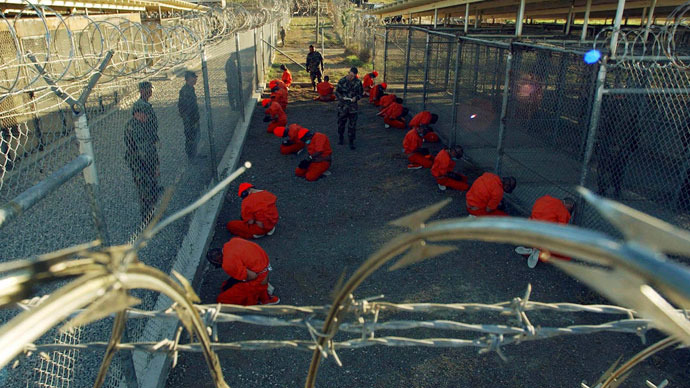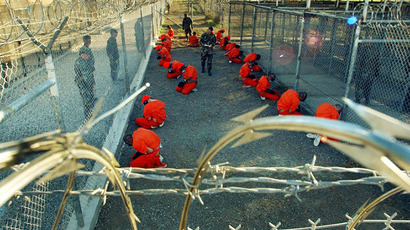Failing health feared for Gitmo inmates on hunger strikes

The health of prisoners held in Kafkaesque limbo at the Guantanamo Bay detention camp has deteriorated alarmingly after over 100 inmates went on a protest hunger strike five weeks ago.
The detainees have claimed that most of them are involved in the
do-or-die strike, and their attorneys have become concerned about
the prisoners’ worsening health.
“By day 45 we understand from medical experts there are
serious health repercussions that start happening. Loss of hearing,
potential blindness,” Pardiss Kebriaei, a New York lawyer
representing Yemeni detainee Ghaleb Al-Bihanim told RT. “The
potential there is for death as well if the hunger strike continues
for weeks.”
Her client has allegedly lost 20 pounds since the beginning of
the strike. The collective protest was reportedly triggered by the
prison staff’s seizure of the inmates' personal belongings. The
hunger strike began on February 6, with the prisoners protesting
against the confiscation of their personal letters, photographs and
legal mail, as well as the allegedly sacrilegious handling of their
Korans during searches of their cells.
While prison officials have acknowledged that the hunger strike has been taking place, they have denied that the protest is large in scale, or threatening to prisoners’ health. According to Robert Durand, the director of public affairs for Joint Task Force Guantanamo, only nine detainees are refusing food, five of whom are being fed through tubes inserted into their stomachs.

Durand said the claims of desecration of the Koran are
unfounded: "There have been no incidents of desecration of the
Koran by guards or translators, and nothing unusual happened during
a routine search for contraband," he told AFP.
The detainees’ lawyers and human rights activists have called
for a response by authorities more meaningful than the few remarks
made by the prison’s media spokesperson.
The detention camp in eastern Cuba reportedly holds 166 men
seized in counterterrorism operations, most of who have been held
without charge for a decade. Although Barack Obama promised to shut
down the facility at the beginning of his first term as president,
the facility remains open.
The UN said that the policy of indefinite detention at
Guantanamo Bay amounts to torture, while prisoners not formally
accused of a crime have hoped to finally be brought before a court.
Although half of the Guantanamo detainees have received papers from
the US government clearing them for release, they are still being
held at the camp.
“That context where we have individuals incarcerated,
isolated from each other, and they don’t know if they are going to
get out tomorrow or never. That sets off a circumstance for extreme
psychological stress,” Dr. Mark Mason, an anthropologist who
studies the cultural factors behind human suffering told
RT.

The real challenge for the detainees is to make themselves heard
by means of the hunger strike. Their lawyers have sent a letter to
the US Defense Secretary Chuck Hagel urging him to take action to
end the protest.
“It’s really an abominable humanitarian situation where
you’re depriving these people of life and liberty and for no really
valid basis,” detainee lawyer Eric Montalvo told RT.
Human rights organizations have reported hundreds of suicide
attempts, at least seven of which were successful. Last September,
a Yemeni detainee took his life after spending more than a decade
at Guantanamo. Adnan Latif had been cleared for release by both the
Bush and Obama administrations, but was never freed.
“President Obama in his first term within 24 hours said, ‘I’m
gonna close Guantanamo Bay because it doesn’t need to exist,’ and
yet we sit here how many years later and we talk about all of the
budget cuts and millions and millions and millions of dollars that
we’re spending on this facility, the medical care, the
transportation of personnel to and from, the upgrade of the
facilities,” Montalvo said.
“It’s just nonsensical, it makes absolutely no sense and
somebody needs to go down there, make some decisions and clear that
place out because it has no purpose other than babysitting a bunch
of adult people that have been cleared of any wrongdoing and they
just need to be sent home,” he added.
Guantanamo Bay was opened on the wake of 9/11 as part of the
George W. Bush administration’s War on Terror. Washington has
alleged the inmates are terrorists who plotted or acted against the
American people. Guantanamo Bay became a source of heated public
debate after it was revealed that US forces had tortured
detainees.














